Do you have a furry feline friend? Does it seem like they’ve been going through a bad hair day, every day? If you’ve noticed your cat pulling out chunks of hair lately, don’t brush it off as just another shedding season.
Excessive hair loss can be alarming and a sign that something is not right. So, why do cats pull their hair out in chunks?
As a cat owner or enthusiast, you know that cats have peculiar habits and behaviors. Hair-pulling is one such behavior that can leave you scratching your head.
It could be due to allergies, skin irritations, stress, anxiety, or even boredom. In this blog post, we’ll delve into the reasons why cats pull their hair out in chunks.
We’ll explore the different causes behind this phenomenon and help you identify the underlying problem that may be causing your cat’s hair loss.
Additionally, we’ll share practical tips and strategies to help reduce your feline’s hair-pulling behavior and promote healthy coats.
Causes of Cats Pulling Their Hair Out in Chunks
This behavior can be a sign of an underlying issue, both medical and behavioral.
One of the most common causes of cats pulling their hair out is skin irritation or allergies. These allergies can be caused by food, environmental factors such as pollen or dust, or flea bites.
When a cat has an allergic reaction, they may start biting or scratching at their skin, leading to hair loss. A visit to the veterinarian is essential to diagnose and treat any skin irritations or allergies.

Stress, anxiety, boredom, or even obsessive-compulsive disorder (OCD) can cause cats to excessively groom themselves and pull out their hair. This behavior may also be a form of self-soothing or a response to changes in their environment.
If you suspect your cat is experiencing behavioral issues, providing more toys and activities or implementing stress-reducing techniques such as pheromone diffusers or calming music can help alleviate the behavior. Medical conditions like hyperthyroidism or ringworm can also cause cats to pull out their hair in chunks.
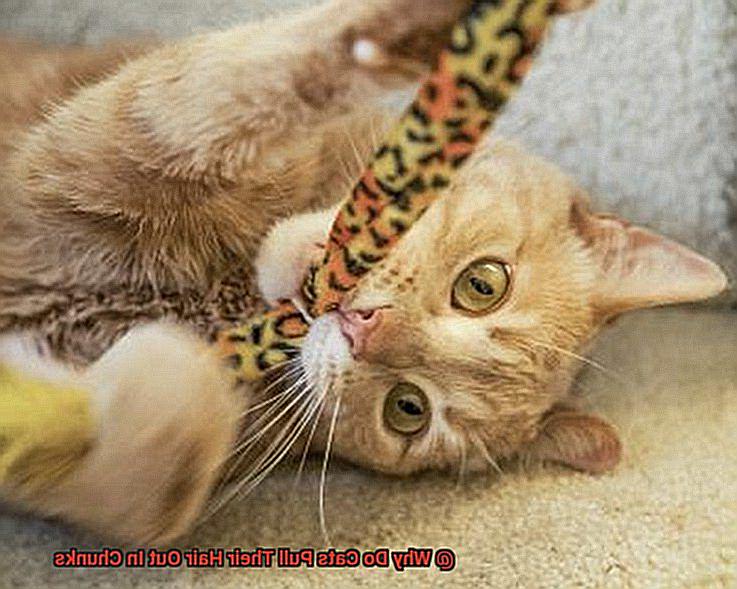
Hyperthyroidism is a condition where the thyroid gland produces too much hormone, leading to skin problems and hair loss. Ringworm is a fungal infection that causes circular bald patches on the skin.
If you suspect your cat has any medical condition causing hair loss, it’s crucial to visit a veterinarian for proper diagnosis and treatment. In summary, it’s essential to identify the root cause of your cat’s excessive grooming and hair pulling to ensure proper treatment.
Cats pulling their hair out in chunks can be caused by medical or behavioral issues. A visit to the veterinarian is recommended to rule out any medical conditions that may be causing the behavior.
Improving your cat’s environment with more toys, activities, and stress-reducing techniques can also help alleviate any behavioral issues causing hair loss.
Skin Irritation or Allergies
Cats can develop allergies to various things, including fleas, food, pollen, dust mites, and even certain fabrics.
When a cat is allergic to something, their immune system kicks into overdrive, resulting in inflammation and itching. The constant itching can cause bald patches and sores on the skin.
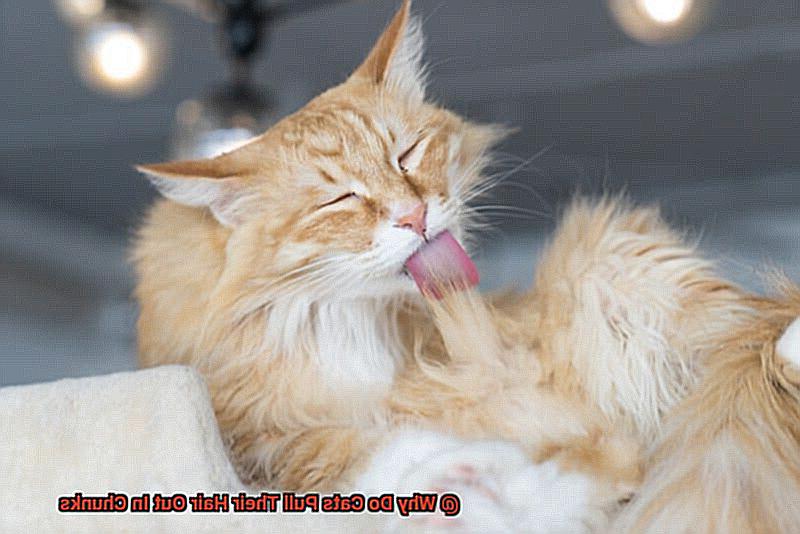
To relieve the discomfort, cats will often lick and chew on the affected area, causing further hair loss. Another common reason for skin irritation in cats is flea infestation.
These tiny parasites feed on a cat’s blood, causing severe itching and discomfort. When a cat is infested with fleas, they will often scratch and chew at their skin, which can lead to more hair loss.
If you suspect that your cat has skin irritation or allergies, it’s crucial to visit your veterinarian for an accurate diagnosis. Your vet may recommend allergy testing or other diagnostic tests to determine the underlying cause of your cat’s hair loss.
After identifying the cause, removing it from your cat’s environment is essential to prevent further hair loss. For example, if your cat is allergic to fleas, regular flea prevention measures such as using flea collars or topical treatments can help keep fleas at bay.
Aside from eliminating the allergen from your cat’s surroundings, there are other ways you can help ease their discomfort. Stress-reducing techniques such as pheromone diffusers or calming music can be beneficial.
Additionally, providing plenty of toys and activities can keep your cat occupied and reduce stress levels. In conclusion, skin irritation or allergies are a common reason why cats pull out their fur in chunks.
Stress and Anxiety
Cats, like humans, can experience stress and anxiety from various sources.
Changes in their environment, illness or injury, separation anxiety, fear of loud noises or strangers, and even boredom can all trigger these emotions. Unfortunately, when cats feel stressed or anxious, they may resort to self-injury as a coping mechanism.
Hair pulling is a common symptom of stress and anxiety in cats. If left unchecked, this behavior can lead to serious health problems such as skin irritation or allergies.
Therefore, it’s essential to identify the root cause of your cat’s stress or anxiety and take steps to address it. To help your cat feel more at ease, you can create a calm and comfortable environment for them.
Ensure that they have plenty of mental stimulation and playtime to keep them occupied. You can also seek help from a veterinarian or animal behaviorist if the situation becomes too overwhelming.
It’s important to note that medication should always be used as a last resort and under the guidance of a veterinary professional. By identifying and addressing the underlying cause of your cat’s stress or anxiety, you can prevent them from resorting to harmful behaviors like pulling their hair out in chunks.
Medical Conditions
While stress and anxiety can be factors, it’s essential to consider the possibility of underlying medical conditions.
One such condition is feline alopecia, a type of hair loss caused by hormone imbalances, allergies, or stress. In severe cases, feline alopecia could indicate an underlying medical issue like hyperthyroidism.
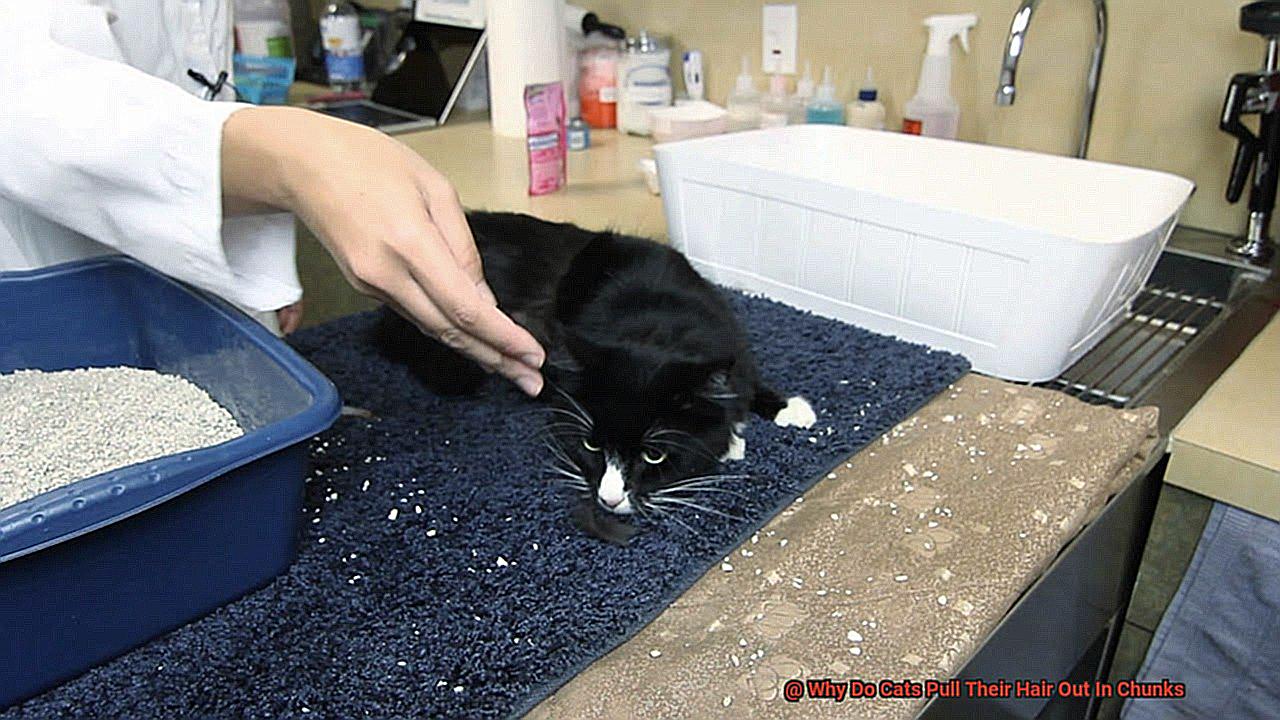
Another potential cause of hair loss is psychogenic alopecia, often linked to anxiety or stress, leading to excessive grooming and bald patches on the skin. It’s important to note that skin infections and parasites like fleas and mites could also contribute to hair loss in cats.
Observing any changes in your cat’s behavior or appearance and seeking veterinary care as soon as possible is crucial. Early treatment can help prevent further hair loss and ensure any underlying medical conditions are identified and treated effectively.
Apart from seeking veterinary care, there are steps you can take at home to create a calm environment for your stressed-out kitty.
Providing plenty of mental stimulation through playtime and interactive toys, as well as creating a cozy retreat with soft bedding and calming scents, can all help alleviate anxiety and reduce self-injurious behavior.
How to Identify the Underlying Cause
In this section, we will discuss how to identify the underlying cause of hair-pulling in cats.
The Importance of Identifying the Underlying Cause
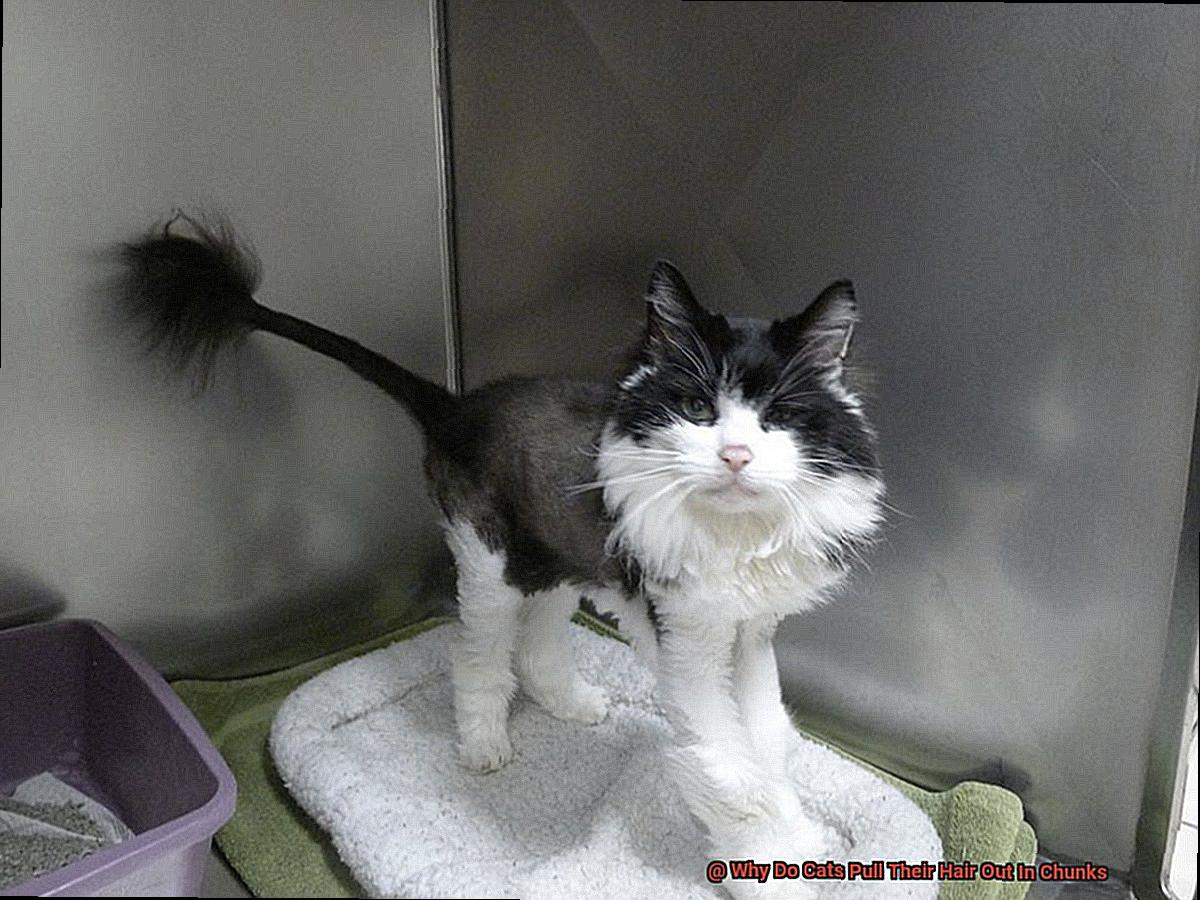
Identifying the root cause of hair-pulling in cats is crucial for finding a solution and preventing further hair loss. By understanding why your cat is engaging in this behavior, you can provide them with appropriate care and treatment.
This will not only alleviate their discomfort but also ensure that they live a happy and healthy life.
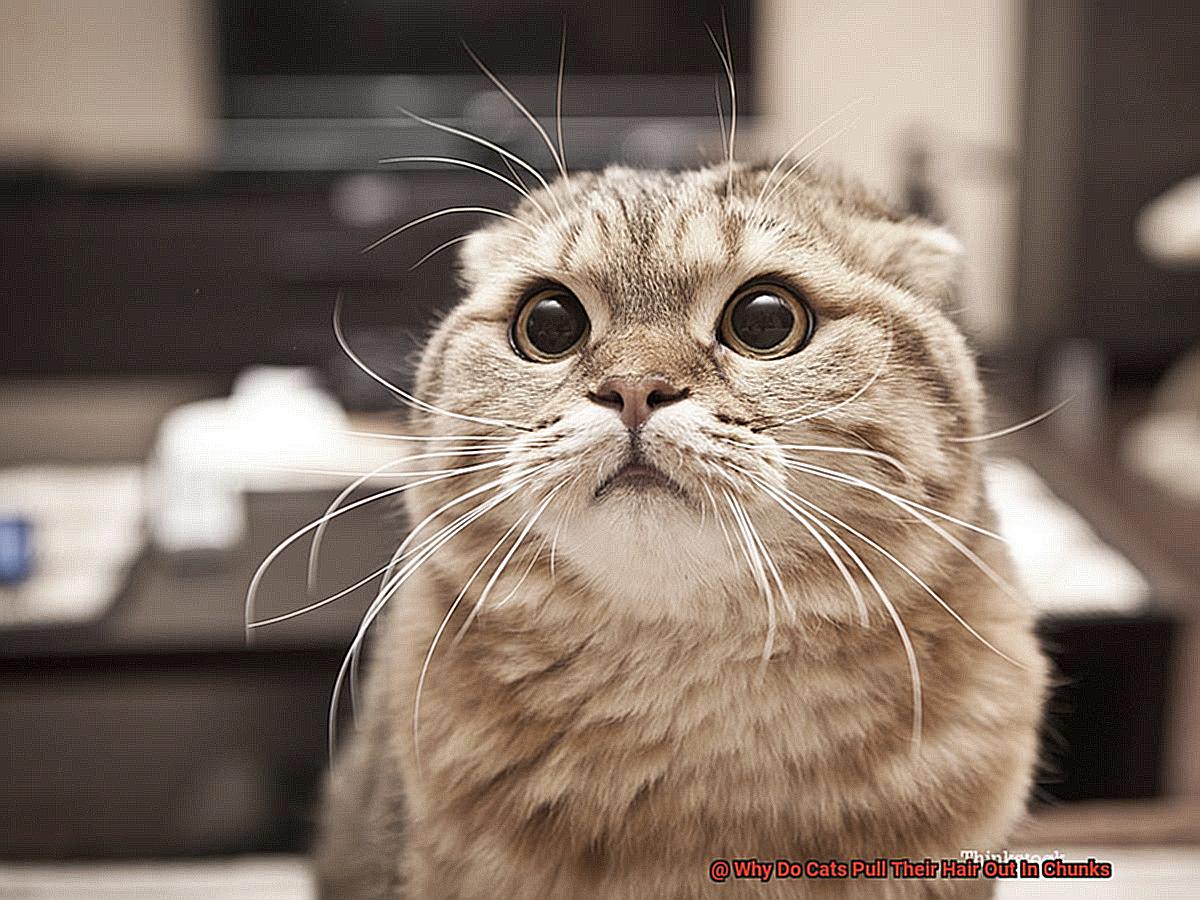
Observing Your Cat’s Behavior
Observing your cat’s behavior is key to identifying the underlying cause of hair-pulling. You should pay attention to patterns in their behavior, such as when they engage in this behavior, how often, and what precedes it.
Careful observation will help you determine if the cause is due to stress or anxiety, boredom, allergies, or medical conditions.
Common Causes of Hair-Pulling in Cats
Fleas, allergies, anxiety, boredom, and skin conditions are common causes of hair-pulling in cats. Flea bites can cause intense itching, leading to excessive grooming and hair loss. Allergies can cause skin irritation and itchiness.
Anxiety and boredom can lead to hair-pulling when a cat is alone or during times of stress. Skin conditions such as ringworm or mites can also cause hair-pulling.
Ruling Out Physical Reasons for Hair-Pulling
Before identifying the underlying cause of hair-pulling in your cat, it’s essential to rule out any physical reasons.
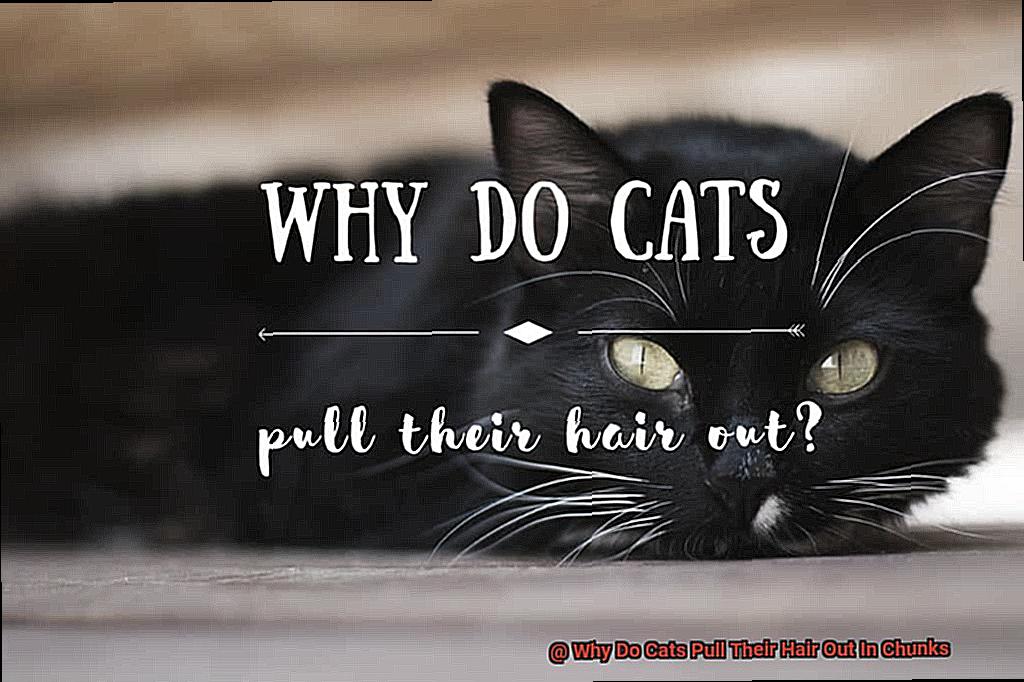
Ensure that your cat is on a healthy diet and not experiencing any discomfort or pain. Regular grooming and checking for fleas or ticks can also help prevent excessive hair-pulling.
Seeking Veterinary Care
If you suspect that your cat may be pulling their hair out due to medical reasons or allergies, it’s best to take them to a veterinarian for a check-up.
Your vet may perform tests or prescribe medication to treat the underlying condition.
Seeking veterinary care can help ensure that your cat receives proper diagnosis and treatment, which is crucial for their long-term health.
So, identifying the underlying cause of hair-pulling in cats requires careful observation and attention to detail.
By ruling out any physical reasons and observing changes in your cat’s behavior and environment, you can determine the root cause and find a solution. Seeking veterinary care may also be necessary in some cases.
Solutions for Preventing Further Hair Loss
To start, make sure your cat is eating a healthy and balanced diet. A protein-rich diet can promote healthy skin and fur growth, which can reduce the risk of excessive shedding or hair loss.
Additionally, regular grooming can help remove loose hair and prevent matting, which can also lead to hair loss. Brushing your cat’s fur daily can help distribute oils throughout their coat, providing natural moisture and promoting healthy hair growth.
If your cat is experiencing hair loss due to an underlying medical condition such as allergies or infection, it’s crucial to consult with your veterinarian. They may recommend medications or treatments to address the underlying issue and prevent further hair loss.
But did you know that stress or anxiety may also contribute to your cat’s hair pulling behavior? Creating a calm and stable environment for your cat is key to reducing their stress levels and preventing further hair loss.
This could include providing plenty of toys and enrichment activities, using calming pheromone sprays or diffusers, or creating a quiet space for your cat to retreat to.
So, preventing further hair loss in cats requires a multifaceted approach that addresses both their physical and emotional needs.
Diet and Nutrition Considerations
To prevent this, it’s important to provide your cat with a balanced diet that contains all the necessary nutrients for healthy skin and fur. Without essential fatty acids, vitamins, and minerals, your cat may develop dry and flaky skin, leading to itching and irritation.
This discomfort can cause excessive grooming and hair pulling. But it’s not just a lack of nutrients that can cause this behavior – food allergies or sensitivities to certain ingredients in your cat’s diet can also contribute.
Common allergens include chicken, beef, dairy, and wheat gluten. These allergic reactions can affect your cat’s skin and fur, causing even more discomfort and excessive grooming.
So what can you do to help? Start by making sure your cat has access to clean water at all times to prevent dry skin.
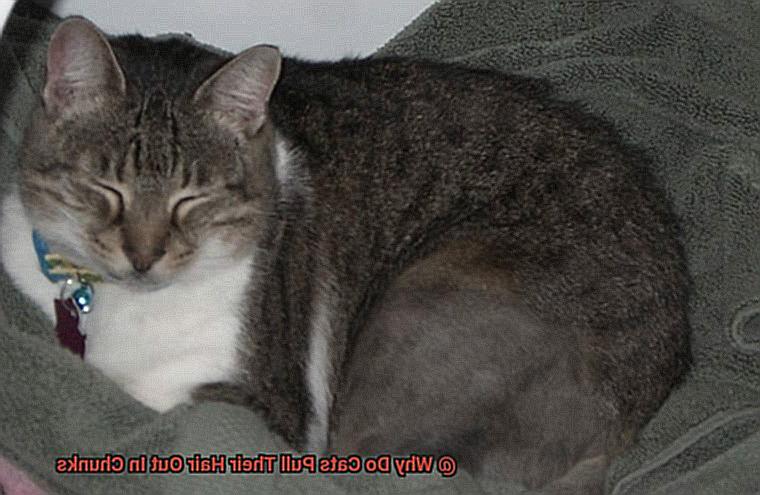
Additionally, supplements like omega-3 fatty acids, biotin, and zinc can help with skin hydration and hair growth. If you suspect a food allergy or sensitivity is causing the hair pulling, talk to your veterinarian about hypoallergenic diets or elimination diets.
These methods can help identify the problematic ingredient and provide an alternative solution. In conclusion, paying attention to your cat’s diet and nutrition is crucial for preventing hair pulling behavior.
A balanced diet containing essential nutrients, avoidance of potential allergens, and supplementation of beneficial nutrients are all key factors in promoting healthy skin and fur while reducing the risk of excessive grooming and hair loss.
Grooming Tips for Cats with Hair Loss
Hair loss in cats can be caused by various factors, such as skin irritation, allergies, stress, or underlying medical conditions. Identifying the underlying cause is crucial to finding a solution and preventing further hair loss.
Here, I’ll share some grooming tips for cats with hair loss that will help promote healthy hair growth and prevent further hair loss.
Use a Soft-Bristled Brush
The first tip is to use a soft-bristled brush or comb when grooming your cat. A soft-bristled brush is gentle on the skin and helps to remove loose hair without causing further irritation.
Regular brushing stimulates blood circulation, which promotes healthy hair growth.
Brush your cat regularly, especially during shedding seasons, to keep their coat healthy and minimize hair loss.
Use a Specialized Shampoo
The second tip is to use a specialized shampoo that can soothe and heal irritated skin.
Look for shampoos that contain natural ingredients like oatmeal or aloe vera, which have anti-inflammatory properties that can help reduce itching and promote healing.
Avoid using harsh shampoos or soaps as they can strip the natural oils from your cat’s skin, leading to dryness and further hair loss.
Trim Your Cat’s Nails
The third tip is to trim your cat’s nails regularly. Long nails can cause scratching and biting at irritated skin, leading to further hair loss.
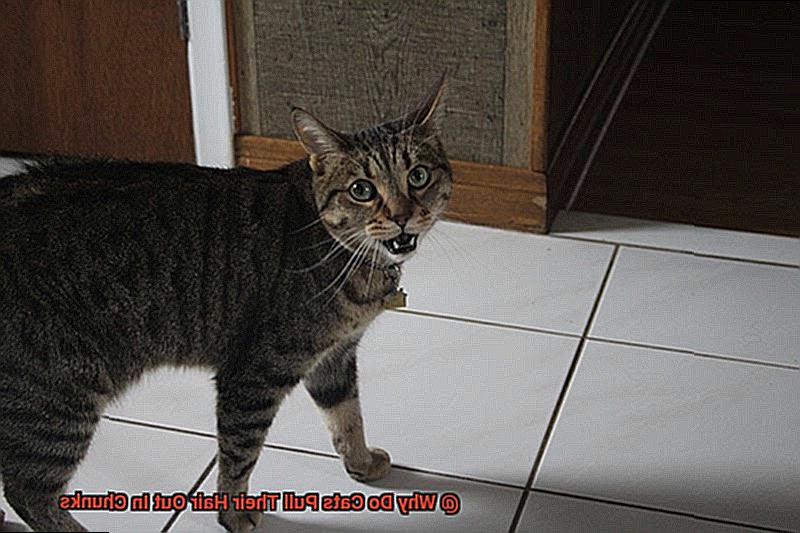
Be careful when trimming your cat’s nails and avoid cutting the quick – the pink part of the nail that contains blood vessels and nerves.
If you’re not confident trimming your cat’s nails, ask a veterinarian or professional groomer for assistance.

Feed Your Cat a Healthy Diet
The fourth tip is to feed your cat a healthy diet that contains all the necessary nutrients for healthy skin and coat. Omega-3 fatty acids are essential for maintaining healthy skin and promoting hair growth.
Feeding your cat high-quality food with essential nutrients can improve their coat’s health.
Ensure that your cat has access to fresh water at all times to keep them hydrated.
Seek Veterinary Attention
Finally, if you notice excessive hair loss or bald patches on your cat’s coat, it is important to seek veterinary attention. Hair loss can be a symptom of an underlying medical condition such as allergies, parasites, or hormonal imbalances.
A veterinarian can diagnose the underlying condition and provide appropriate treatment to help your cat’s coat regrow.
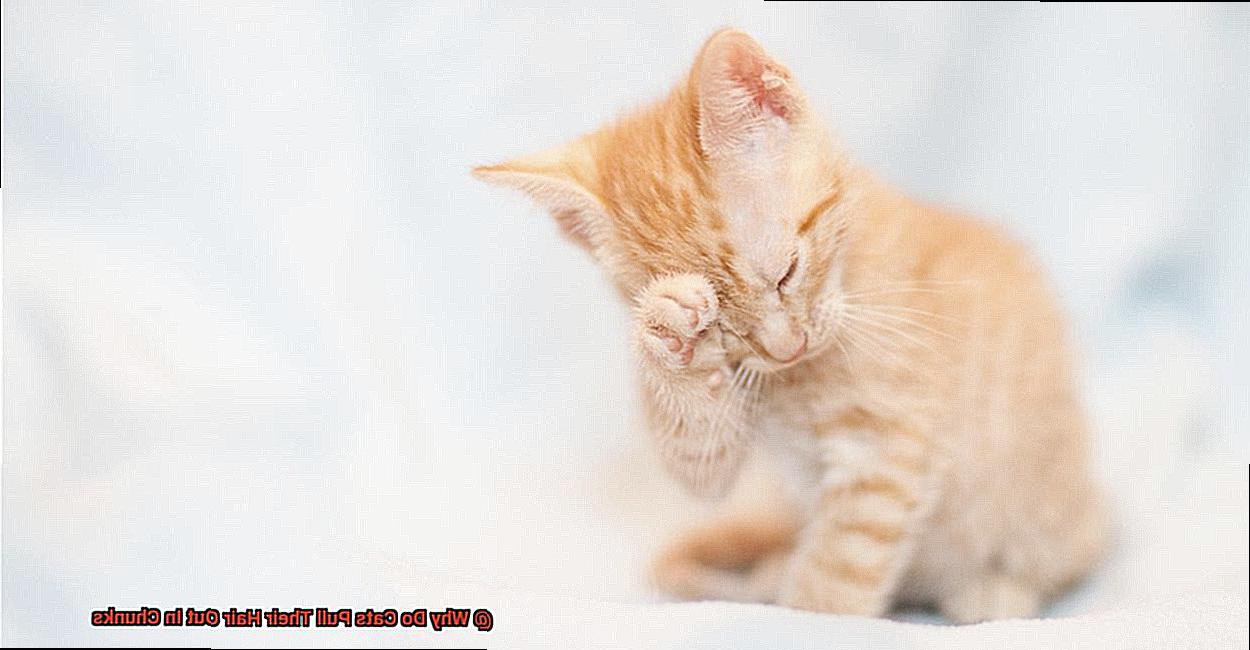
In conclusion, proper grooming is essential for cats with hair loss as it helps remove loose and dead hair that can irritate the skin and cause more hair loss.
By using a soft-bristled brush, a specialized shampoo, trimming their nails, feeding them a healthy diet, and seeking veterinary attention when necessary, you can help prevent further hair loss and promote healthy hair growth in cats with hair loss.
When to See a Vet for Hair Loss in Cats
Shedding and hairballs are common, but if you notice excessive or sudden hair loss in your kitty, it’s time to seek professional help from a veterinarian.
Hair loss in cats can be caused by a variety of factors, ranging from fleas or mites to underlying medical conditions. Whatever the cause may be, it’s crucial to address the issue promptly to prevent further complications.
Flea and mite infestations can lead to scratching, scabs, and sores on the skin. If you notice small black specks (flea dirt) in your cat’s fur, it’s time to take action.
A veterinarian can provide proper treatment and alleviate any discomfort your cat may be experiencing. Allergies are another culprit of hair loss in cats.
If you notice other symptoms such as itching, redness, or swelling along with hair loss, it’s important to get your pet evaluated by a veterinarian. Identifying the source of the allergy and providing appropriate treatment can help prevent further complications.
Sometimes, hair loss can be a symptom of underlying medical conditions such as thyroid issues or hormonal imbalances. If your cat is experiencing sudden or excessive hair loss with no apparent cause, it’s best to have them seen by a veterinarian who can run tests and diagnose any underlying health issues.
Don’t wait until it’s too late to seek professional help for your furry friend. Early detection and treatment of these issues can help ensure the best possible outcome for your cat.
XaZBHIdVf5w” >
Conclusion
If you’ve noticed your cat pulling out chunks of their hair, it’s important to take action and seek veterinary advice.
By providing a safe and comfortable environment for your feline friend and addressing any underlying medical issues, you can help prevent excessive hair pulling and ensure they live a happy and healthy life.







